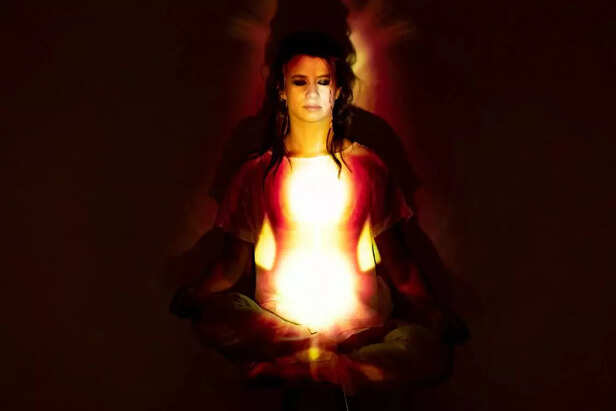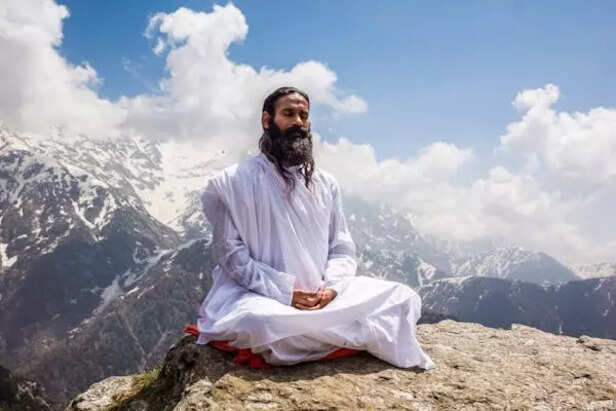You Came Empty-Handed, You’ll Leave the Same: The Gita’s Reminder
Nidhi | May 28, 2025, 14:28 IST
( Image credit : Times Life Bureau )
We all come into this world with empty hands — no money, no status, no possessions. And one day, we’ll leave the same way. The Bhagavad Gita beautifully reminds us of this simple truth, urging us to focus less on what we own and more on who we truly are. This article gently explores how embracing this lesson can help us live with less fear, less attachment, and more peace. Through timeless verses and thoughtful insights, it invites you to reflect on the deeper meaning of life, death, and the soul’s journey beyond everything material.
You did not enter this world with gold, titles, or even a name. You came with nothing — no past to prove, no future to chase. And one day, you will leave in just the same way: without a suitcase, without a goodbye, without the things you thought were yours.
In the spaces between birth and death, we gather — wealth, relationships, memories, wounds, triumphs. We forget that none of it was truly ours. The Bhagavad Gita, like a quiet whisper from eternity, reminds us: You are not the possessor. You are the passerby.
This isn’t a message of loss. It is a call to freedom — to live without fear, love without ownership, act without ego, and die without regret.
Let us rediscover this ancient truth — not just in words, but in the core of our being.

“देही नित्यमवध्योऽयं देहे सर्वस्य भारत।
तस्मात् सर्वाणि भूतानि न त्वं शोचितुमर्हसि॥”
(Gita 2.30)
“The embodied Self is eternally indestructible, O Bharata. Therefore, you should not grieve for any being.” In Vedantic philosophy, the Self (Atman) is untouched by material gain or loss. It simply is — eternal, luminous, silent.
Everything we claim to “own” — our homes, titles, wealth, bodies, even our relationships — exists only in relation to this body, this passing role. But the Self is not the body. It does not possess — it witnesses.
To believe we possess anything is to misunderstand who we are.
“न हि कश्चित्क्षणमपि जातु तिष्ठत्यकर्मकृत्।
कार्यते ह्यवशः कर्म सर्वः प्रकृतिजैर्गुणैः॥”
(Gita 3.5)
“Indeed, none can remain inactive even for a moment; everyone is helplessly driven to action by the qualities born of nature.” What follows us beyond this birth is not gold, but karma — the subtle residue of action, intention, and inner state. It is not the results we produced, but the purity with which we acted, that shapes our next becoming.
The Gita urges us not to renounce action, but to purify it. When we act without craving for the fruit, we polish the mirror of the soul.
That polished inner being — not our achievements — is the only wealth we carry onward.
“अहंकारं बलं दर्पं कामं क्रोधं च संश्रिताः…
तानहं द्विषतः क्रूरान् संसारेषु नराधमान्
क्षिपाम्यजस्रमशुभानासुरीष्वेव योनिषु॥”
(Gita 16.18–19)
“Puffed up by ego, strength, desire, and anger, these demonic beings hate Me in themselves and others. These cruel beings I repeatedly cast into the wombs of darkness.” What we call “I” is often a pile of illusions — names, identities, roles, and pride. But death dissolves these in an instant. The CEO becomes ashes. The scholar becomes silence.
Krishna reminds Arjuna: what perishes was never real. Ego is a costume worn by the Self. To awaken is to remove it — voluntarily, before life does it for you.
Letting go of ego is not humility. It is truthfulness.

“अनित्यं असुखं लोकम् इमं प्राप्य भजस्व माम्॥”
(Gita 9.33)
“Having come into this impermanent and joyless world, surrender unto Me.” The temporariness of all things is not a flaw. It is the very structure of dharma — the way of spiritual evolution.
That which is fleeting urges us to seek the eternal. That which is perishable makes us long for what is deathless. This is the grace hidden in suffering, and the truth within transience.
What ends reminds us that only the Self remains. And to live with this awareness is to live awake.
“योगस्थः कुरु कर्माणि संगं त्यक्त्वा धनञ्जय।
सिद्ध्यसिद्ध्योः समो भूत्वा समत्वं योग उच्यते॥”
(Gita 2.48)
“Be steadfast in yoga, O Arjuna. Perform your duty and abandon all attachment to success or failure. Such evenness of mind is called yoga.” We are not told to walk away from life — only from the illusion of ownership. The Gita does not teach abandonment, but balance. Even-mindedness in success and failure.
Detachment (vairāgya) is not about leaving the world. It is about not letting the world chain the soul.
When you know you own nothing, you begin to love purely, act freely, and live fully — for nothing is lost, and nothing is yours to lose.“वासांसि जीर्णानि यथा विहाय
नवानि गृह्णाति नरोऽपराणि।
तथा शरीराणि विहाय जीर्णा
न्यानि संयाति नवानि देही॥”
(Gita 2.22)
“Just as a person discards worn-out clothes and puts on new ones, the soul discards a worn-out body and takes on another.” What we call “death” is not an end. It is a transition. The eternal Self simply moves to another garment, another chapter.
If the body is a robe, then death is only the changing of clothes. The Self does not weep. It continues its journey through samsara until it awakens fully — to its own formless nature.
“नासतो विद्यते भावो नाभावो विद्यते सतः।
उभयोरपि दृष्टोऽन्तस्त्वनयोस्तत्त्वदर्शिभिः॥”
(Gita 2.16)
“That which is unreal never comes into existence. That which is real never ceases to be. The seers of truth have concluded this.” The world of form, achievement, possession — it belongs to the unreal, the asat. It appears, dazzles, and disappears.
But the real — the Self, the divine, the truth of your being — is never lost, never gained, never altered. To know this is to stand in stillness while the world dances around you.
That truth is your anchor. All else is driftwood. When Krishna tells Arjuna, “You came empty-handed and will leave the same,” he is not speaking despair — he is offering liberation.
If you own nothing, then nothing can be taken from you.
If you are not this body, then death cannot destroy you.
If you are not your achievements, then failure cannot define you.
The Gita’s wisdom is not a withdrawal from life — it is an awakening within life. To see clearly, love freely, and act without fear. Because in the end, you don’t lose. You shed. And what remains is who you truly are.
“मामुपेत्य पुनर्जन्म दु:खालयमशाश्वतम्।
नाप्नुवन्ति महात्मान: संसिद्धिं परमां गता:॥”
(Gita 8.15)
“Having attained Me, the great souls do not take birth again in this temporary world of suffering, for they have attained the highest perfection.”
In the spaces between birth and death, we gather — wealth, relationships, memories, wounds, triumphs. We forget that none of it was truly ours. The Bhagavad Gita, like a quiet whisper from eternity, reminds us: You are not the possessor. You are the passerby.
This isn’t a message of loss. It is a call to freedom — to live without fear, love without ownership, act without ego, and die without regret.
Let us rediscover this ancient truth — not just in words, but in the core of our being.
1. The Self Is Not the Possessor — It Is the Witness

Self
( Image credit : Pexels )
“देही नित्यमवध्योऽयं देहे सर्वस्य भारत।
तस्मात् सर्वाणि भूतानि न त्वं शोचितुमर्हसि॥”
(Gita 2.30)
“The embodied Self is eternally indestructible, O Bharata. Therefore, you should not grieve for any being.” In Vedantic philosophy, the Self (Atman) is untouched by material gain or loss. It simply is — eternal, luminous, silent.
Everything we claim to “own” — our homes, titles, wealth, bodies, even our relationships — exists only in relation to this body, this passing role. But the Self is not the body. It does not possess — it witnesses.
To believe we possess anything is to misunderstand who we are.
2. Karma Is the Only Inheritance of the Soul

Soul
( Image credit : Pexels )
“न हि कश्चित्क्षणमपि जातु तिष्ठत्यकर्मकृत्।
कार्यते ह्यवशः कर्म सर्वः प्रकृतिजैर्गुणैः॥”
(Gita 3.5)
“Indeed, none can remain inactive even for a moment; everyone is helplessly driven to action by the qualities born of nature.” What follows us beyond this birth is not gold, but karma — the subtle residue of action, intention, and inner state. It is not the results we produced, but the purity with which we acted, that shapes our next becoming.
The Gita urges us not to renounce action, but to purify it. When we act without craving for the fruit, we polish the mirror of the soul.
That polished inner being — not our achievements — is the only wealth we carry onward.
3. Ego Is the Most Fragile Possession

Ego
( Image credit : Pexels )
“अहंकारं बलं दर्पं कामं क्रोधं च संश्रिताः…
तानहं द्विषतः क्रूरान् संसारेषु नराधमान्
क्षिपाम्यजस्रमशुभानासुरीष्वेव योनिषु॥”
(Gita 16.18–19)
“Puffed up by ego, strength, desire, and anger, these demonic beings hate Me in themselves and others. These cruel beings I repeatedly cast into the wombs of darkness.” What we call “I” is often a pile of illusions — names, identities, roles, and pride. But death dissolves these in an instant. The CEO becomes ashes. The scholar becomes silence.
Krishna reminds Arjuna: what perishes was never real. Ego is a costume worn by the Self. To awaken is to remove it — voluntarily, before life does it for you.
Letting go of ego is not humility. It is truthfulness.
4. Impermanence Is the Design of Dharma

Surrender
( Image credit : Pexels )
“अनित्यं असुखं लोकम् इमं प्राप्य भजस्व माम्॥”
(Gita 9.33)
“Having come into this impermanent and joyless world, surrender unto Me.” The temporariness of all things is not a flaw. It is the very structure of dharma — the way of spiritual evolution.
That which is fleeting urges us to seek the eternal. That which is perishable makes us long for what is deathless. This is the grace hidden in suffering, and the truth within transience.
What ends reminds us that only the Self remains. And to live with this awareness is to live awake.
5. Detachment Is Not Rejection — It Is Refinement

Detachment
( Image credit : Pexels )
“योगस्थः कुरु कर्माणि संगं त्यक्त्वा धनञ्जय।
सिद्ध्यसिद्ध्योः समो भूत्वा समत्वं योग उच्यते॥”
(Gita 2.48)
“Be steadfast in yoga, O Arjuna. Perform your duty and abandon all attachment to success or failure. Such evenness of mind is called yoga.” We are not told to walk away from life — only from the illusion of ownership. The Gita does not teach abandonment, but balance. Even-mindedness in success and failure.
Detachment (vairāgya) is not about leaving the world. It is about not letting the world chain the soul.
When you know you own nothing, you begin to love purely, act freely, and live fully — for nothing is lost, and nothing is yours to lose.
6. The Body Is a Vehicle, Not a Final Address
नवानि गृह्णाति नरोऽपराणि।
तथा शरीराणि विहाय जीर्णा
न्यानि संयाति नवानि देही॥”
(Gita 2.22)
“Just as a person discards worn-out clothes and puts on new ones, the soul discards a worn-out body and takes on another.” What we call “death” is not an end. It is a transition. The eternal Self simply moves to another garment, another chapter.
If the body is a robe, then death is only the changing of clothes. The Self does not weep. It continues its journey through samsara until it awakens fully — to its own formless nature.
7. What Is Real Cannot Be Lost

Loss
( Image credit : Pexels )
“नासतो विद्यते भावो नाभावो विद्यते सतः।
उभयोरपि दृष्टोऽन्तस्त्वनयोस्तत्त्वदर्शिभिः॥”
(Gita 2.16)
“That which is unreal never comes into existence. That which is real never ceases to be. The seers of truth have concluded this.” The world of form, achievement, possession — it belongs to the unreal, the asat. It appears, dazzles, and disappears.
But the real — the Self, the divine, the truth of your being — is never lost, never gained, never altered. To know this is to stand in stillness while the world dances around you.
That truth is your anchor. All else is driftwood.
The Exit Is a Return, Not a Loss
If you own nothing, then nothing can be taken from you.
If you are not this body, then death cannot destroy you.
If you are not your achievements, then failure cannot define you.
The Gita’s wisdom is not a withdrawal from life — it is an awakening within life. To see clearly, love freely, and act without fear. Because in the end, you don’t lose. You shed. And what remains is who you truly are.
“मामुपेत्य पुनर्जन्म दु:खालयमशाश्वतम्।
नाप्नुवन्ति महात्मान: संसिद्धिं परमां गता:॥”
(Gita 8.15)
“Having attained Me, the great souls do not take birth again in this temporary world of suffering, for they have attained the highest perfection.”
